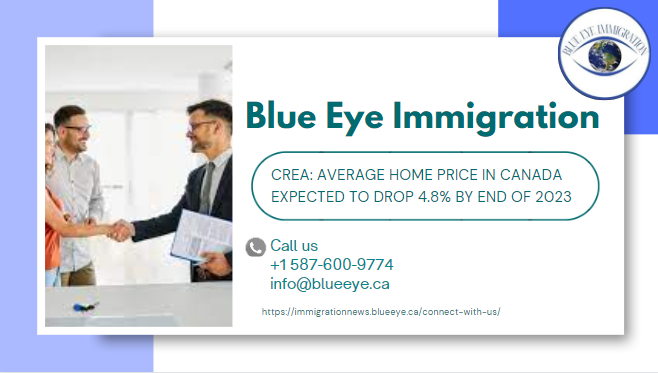The Canadian Real Estate Association (CREA) has indicated that they expect the average price of a home across Canada to decrease by 4.8% by the end of this year.
This percentage decrease is compared to the average price of a home at the end of 2022.
Based on the CREA’s projections, the process of buying a home will become more affordable for all Canadians, including new immigrants just arriving in this country.
More about buying a home in Canada as a newcomer/permanent resident: FHSAs
A recent move by the Canadian government will now make it easier for newcomers across the country to save up for their first home, thanks to a new tax-free First Home Savings Account (FHSA).
As of April 1 this year, Canadian financial institutions are now able to offer a new kind of savings account to eligible Canadian citizens and permanent residents.
To be eligible for an FHSA, the account holder must be a Canadian resident over the age of 17 that is looking to purchase their first home. FHSA holders are required to keep the account open until the first of these conditions is met:
- 15 years have passed since opening the account
- Until the end of the year when they turn 71
- Until the end of the year following the year when they make “a qualifying withdrawal [from the] FHSA” for the purchase of their first home
The FHSA is Canada’s newest effort to increase the affordability of housing in this country. By giving first-time home buyers the ability to accumulate $40,000 in tax-free savings (max. $8,000 per year for five years), the government is hoping that this will aid Canadians in their efforts to save for a down payment on the home.
In fact, the government estimates project that the FHSA will provide $725 million in support over the coming five years.
Note: FHSA contributions will be tax-deductible and withdrawals for the purchase of a first home will be non-taxable
Other first-time home-buying benefits offered to Canadians
1. First-Time Home Buyer Incentive (FTHBI)
The FTHBI offers five or ten percent of a home’s purchase price to eligible Canadians for use on a down payment for the home. By adding to a down payment, this incentive makes homebuying more affordable by reducing “mortgage carrying costs”.
Note: Mortgage carrying costs are the expenses involved with maintaining a home (in this case, mortgage payments)
Canadian citizens, permanent residents and temporary foreign workers are all eligible for this incentive. Click here to learn more about the FTHBI, including eligibility and incentive conditions.
2. Home Buyers’ Plan (HBP)
First-time home buyers buying or building an eligible home in Canada can withdraw up to $35,000 in tax-free dollars (per person) from their RRSP to put toward their first home. The HBP also has a 15-year repayment window.
Eligibility for the HBP requires that the purchased property is occupied as a primary residence for at least the first year and that any contributions made to an RRSP must stay in the account for 90 days.
Find out more about the HBP by clicking this link.
3. Provincial Grants and Incentives
Many provinces/territories across Canada have their own unique grants and incentives for first-time home buyers. A more complete list of these kinds of incentives is available here.
Below are three examples of these programs:
British Columbia’s First-Time Home Buyers’ Program
In British Columbia, this program works to reduce or eliminate property transfer taxes paid by first-time homeowners. Full or partial exemption from this tax is available for qualified purchasers.
Ontario’s Land Transfer Tax Refunds for First-Time Homebuyers
Eligible first-time homebuyers in Ontario who buy land or an interest in land are eligible for a full or partial refund on their land transfer tax. Refunds are now open to all homes in Ontario, including resold homes and new developments.
Nova Scotia’s First-Time Home Buyers’ Rebate Program
This Nova Scotian program offers first-time buyers of newly-built homes a rebate equal to “18.75 percent of the provincial portion of the HST or 1.31 percent of the purchase price of capital stock in a housing cooperative, up to $3,000.”
